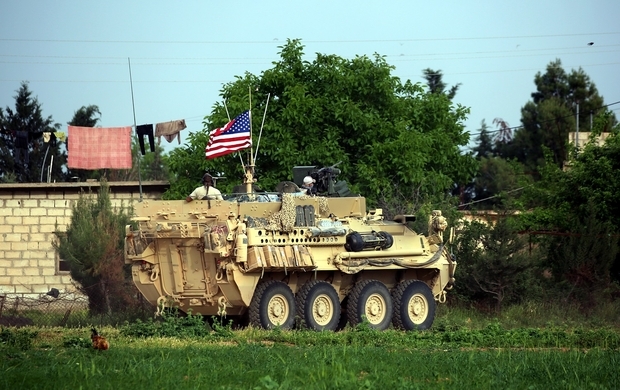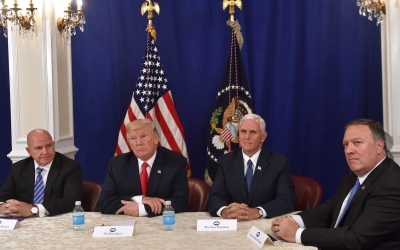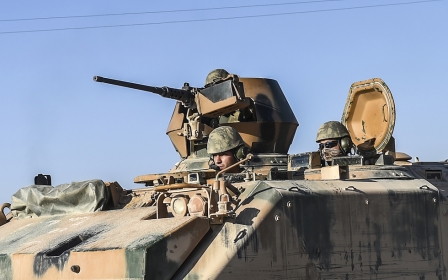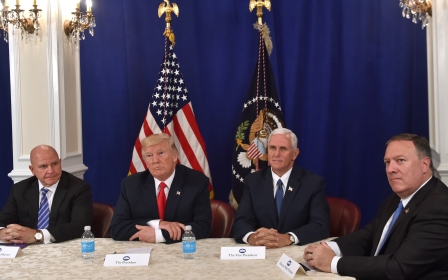US forces withdraw from key base in northern Syria

US forces withdrew from a key base in northern Syria on Sunday, two days before the end of a US-brokered truce to stem a Turkish attack on Kurdish forces in the region, according to a UK-based activist group.
On Thursday, Turkey agreed in talks with US Vice President Mike Pence to a five-day pause in its offensive into northeastern Syria to allow time for Kurdish fighters to withdraw from a "safe zone" Ankara aims to establish near the Turkish border with Syria.
An AFP correspondent saw more than 70 US armoured vehicles escorted by helicopters drive past the town of Tal Tamer carrying military equipment.
Some flew the American stars-and-stripes flag as they made their way eastwards along a highway crossing the town, he said.
The Syrian Observatory for the Human Rights said the convoy was evacuating the military base of Sarrin.
New MEE newsletter: Jerusalem Dispatch
Sign up to get the latest insights and analysis on Israel-Palestine, alongside Turkey Unpacked and other MEE newsletters
It appeared to be heading to the town of Hasakah, further east, said the Observatory, which relies on sources inside war-torn Syria for its information.
Sarrin "is the largest American military base in the north of the country," Observatory chief Rami Abdurrahman said.
It is situated on the edges of the planned "safe zone" on the Syrian side of the border that Turkey wants to use keep Kurdish forces away from its frontier, he added.
Sunday's pullout was the fourth such withdrawal of US forces in a week and left Syria's northern provinces of Aleppo and Raqqa devoid of US troops, Abdurrahman said.
Troops to be stationed in Iraq
US Defense Secretary Mark Esper said on Saturday that all of the nearly 1,000 troops withdrawing from northern Syria are expected to move to western Iraq to continue the campaign against Islamic State (IS) and "to help defend Iraq".
The US-backed truce in Syria aims to ease a crisis triggered by US President Donald Trump's abrupt decision earlier this month to withdraw all 1,000 US troops from northern Syria, a move criticised in Washington and elsewhere as a betrayal of loyal Kurdish allies who had fought for years alongside US troops against IS.
"The US withdrawal continues apace from northeastern Syria... we're talking weeks not days," Esper told reporters en route to the Middle East, adding that the withdrawal was being carried out through aircraft and ground convoys.
"The current game plan is for those forces to re-position into western Iraq," Esper said, adding that they would number about 1,000.
He said the mission for those troops would be to "help defend Iraq" and carry out a counter-IS mission.
A senior US defence official clarified that the situation was still fluid and plans could change.
Any decision to send additional US troops to Iraq is likely to be heavily scrutinised in a country where Iran has been steadily amassing influence.
"That is the current game plan. Things can change between now and whenever we complete the withdrawal, but that is the game plan right now," the senior official added.
'Strategic nightmare'
US Senate Majority Leader Mitch McConnell on Friday attacked Trump's decision to pull troops from Syria as "a strategic nightmare" that will help Washington's foes and hurt its allies.
"Withdrawing US forces from Syria is a grave strategic mistake," McConnell, the top Republican in Congress, wrote in an op-ed published in the Washington Post.
"It will leave the American people and homeland less safe, embolden our enemies, and weaken important alliances."
His comments come after Trump on Wednesday defended his decision to pull US troops out of Syria as "strategically brilliant".
It is unclear whether the US troops will use Iraq as a base to launch ground raids into Syria and carry out air strikes against IS.
The additional US troops would add to the more than 5,000 American troops already based in the country, training Iraqi forces and helping to ensure that IS does not resurge.
While Esper said he had spoken with his Iraqi counterpart and will continue to have conversations in the future, the move will likely be viewed with scepticism by some in Iraq.
Iraq is in the midst of a political crisis. Mass protests led to more than 100 deaths and 6,000 injuries during the week starting 1 October.
Iran's role in responding to the demonstrations has been another reminder of Tehran's reach in Iraq, where a sizeable number of former militia commanders are now members of parliament and support the Iranian agenda.
'Ceasefire generally seems to be holding'
Turkey on Sunday said Kurdish fighters had withdrawn from the besieged Syrian border town of Ras al-Ain under the agreement brokered with the US.
"A convoy of approximately 55 vehicles entered Ras al-Ain and a convoy of 86 vehicles departed in the direction of Tal Tamer," the Turkish defence ministry said in a statement.
The ministry simultaneously distributed pictures of the evacuation.
The ministry said: "There are absolutely no impediments to the withdrawal" of Kurdish forces and "the activities of exiting and evacuation from the region are firmly coordinated with the US counterparts".
Turkish President Recep Tayyip Erdogan said on Saturday that Ankara would press on with its offensive into northeastern Syria and "crush the heads of terrorists" if a deal with Washington on the withdrawal of Kurdish fighters from the area was not fully implemented.
One Turkish soldier was killed and another was wounded on Sunday after an attack by the Syrian Kurdish People's Protection Units (YPG) in northeast Syria's Tel Abyad, Turkey's defence ministry said.
On Saturday, the truce was holding along the border, with just a few Turkish military vehicles crossing, a Reuters reporter at the scene said, but Sunday's attack has underlined how fragile the agreement is.
On Friday, the Kurdish militia accused Turkey of violating the five-day pause by shelling civilian areas in the northeast, including Ras al-Ain.
A senior Turkish official dismissed the accusations on Saturday, saying they were an attempt to sabotage the agreement between Ankara and Washington, and that Turkey fully supported the deal.
Esper said that the ceasefire in northeastern Syria was generally holding.
"I think overall the ceasefire generally seems to be holding. We see a stabilisation of the lines, if you will, on the ground, and we do get reports of intermittent fires, this and that. That doesn't surprise me necessarily," he added.
There has been concern that the Turkish incursion into northeastern Syria would allow IS to make gains and see militants escaping prisons guarded by Kurdish fighters.
Esper said that the US was still in contact with the Kurdish fighters and they appeared to continue to defend the prisons in areas they still controlled.
Middle East Eye delivers independent and unrivalled coverage and analysis of the Middle East, North Africa and beyond. To learn more about republishing this content and the associated fees, please fill out this form. More about MEE can be found here.






